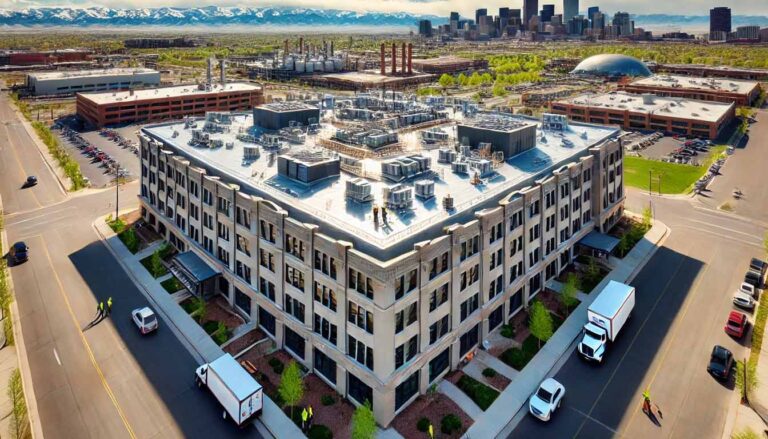Denver’s unique climate presents a variety of challenges for roofing. From intense sun exposure to heavy snowfalls, roofs in this region must be designed and maintained to withstand diverse weather conditions. Weather-proofing a roof in Denver involves several key considerations and best practices to ensure durability and longevity.
Understanding Denver’s Climate Challenges
Denver experiences:
- Intense Sun Exposure: The high altitude increases UV radiation, accelerating wear and tear on roofing materials.
- Heavy Snowfall: Winter months bring significant snow, requiring roofs to bear heavy loads and manage ice dams.
- Hail Storms: Frequent hail storms can cause substantial Damage to roofs, necessitating durable materials.
- Temperature Fluctuations: Rapid temperature changes can cause materials to expand and contract, leading to potential Damage.
Essential Weather-Proofing Strategies
1. Selecting Durable Roofing Materials
Choosing suitable materials is crucial for weather-proofing. Recommended materials for Denver include:
- Asphalt Shingles: Affordable and durable, these can withstand hail and are easy to replace.
- Metal Roofing: Hardly and resistant to severe weather, metal roofing is ideal for snow and hail.
- Tile Roofing: Provides excellent protection against UV radiation and extreme temperatures.
2. Proper Installation Techniques
Correct installation is vital to ensure the roof can withstand harsh weather conditions:
- Adequate Insulation: Proper insulation helps regulate temperature and prevent ice dams.
- Ventilation: Good ventilation reduces moisture buildup, preventing mold and extending the roof’s lifespan.
- Flashing and Sealing: Ensuring all joints, valleys, and edges are properly sealed to prevent water infiltration.
3. Regular Maintenance
Regular maintenance is essential to keep the roof in top condition:
- Routine Inspections: Regularly check for Damage or wear, especially after severe weather.
- Cleaning Gutters: Ensure gutters are clear to prevent water buildup and ice dams.
- Replacing Damaged Shingles: Promptly replace any damaged or missing shingles to prevent leaks.
Managing Weather-Related Damage
1. Documenting Damage
After severe weather, document all Damage with photos or videos for insurance claims and repairs.
2. Filing Insurance Claims
- Contact Your Insurance: Immediately report the Damage and start the claims process.
- Provide Documentation: Submit all evidence of Damage and quotes from roofing contractors.
3. Working with Adjusters
- Public Adjusters: Consider hiring a public adjuster to assess the Damage fairly.
- Review Settlement Offers: Compare offers from your insurance adjuster with quotes from contractors to ensure a fair settlement.
Best Practices for Commercial Roofs
For commercial properties, additional best practices include:
- Regular Professional Inspections: Engage professionals for regular inspections and maintenance.
- High-Quality Roofing Systems: Invest in high-quality, durable roofing systems that withstand commercial use and severe weather conditions.
Weather-Proofing Denver Roofs for Businesses
Businesses in Denver face unique challenges when it comes to weather-proofing their roofs. Commercial roofs must not only endure the same severe weather conditions as residential roofs but also manage the additional stress of housing heavy equipment like HVAC systems and dealing with the foot traffic of maintenance personnel. To ensure the longevity and reliability of commercial roofing systems, businesses need to adopt robust weather-proofing strategies tailored to their specific needs.
Investing in High-Quality Roofing Systems
One of the most crucial steps businesses can take is to invest in high-quality roofing systems designed to withstand Denver’s extreme weather conditions. This includes selecting materials with superior durability and resistance to hail, heavy snow, and intense UV radiation. Thermoplastic Olefin (TPO) and Ethylene Propylene Diene Monomer (EPDM) are famous for flat commercial roofs due to their excellent weather resistance and long lifespan. Additionally, green roofing systems incorporating vegetation can provide added insulation and protection against temperature fluctuations.
Enhanced Insulation and Ventilation
Commercial buildings often have more prominent and complex roofing structures than residential ones. Enhanced insulation and ventilation systems are essential to maintain a stable internal environment and prevent issues like ice dams and condensation. Proper insulation helps reduce energy costs by maintaining consistent indoor temperatures, while adequate ventilation prevents moisture buildup that could lead to mold growth and structural Damage. For businesses, incorporating high-rise insulation materials and advanced ventilation solutions can significantly improve the performance and durability of their roofing systems.
Comprehensive Maintenance Plans
Regular and comprehensive maintenance plans are vital for the upkeep of commercial roofs. Businesses should schedule routine inspections by professional roofing contractors to identify and address potential issues before they escalate into major problems. This includes checking for Damage after severe weather events, ensuring drainage systems function correctly, and keeping the roof surface clean of debris. Implementing a proactive maintenance strategy extends the roof’s lifespan and minimizes costly disruptions to business operations caused by unexpected repairs or replacements.
Conclusion
Weather-proofing a roof in Denver requires careful selection of materials, proper installation, and regular maintenance to handle the region’s extreme weather. By following these strategies and best practices, homeowners and businesses can ensure their roofs remain durable and effective in protecting their properties.
